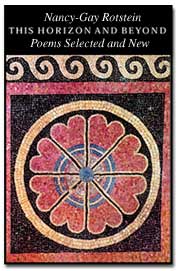|
Uniting pleasure
with truth
Bernard Baskin
Books
May 23, 2002
Not too long ago, when a novelist or dramatist wrote with a flame of
the highest inspiration, his or her work was said to be "touched by
poetry." It was widely believed that no literary genre was closer to
the divine then poetry. For Robert Browning, poetry means putting
this infinite within the finite, and Matthew Arnold spoke for many
when he explained that poetry is simply the most beautiful,
impressive and widely affective way of saying things.
 Unhappily,
however much poetry was exalted in the past, the sad truth is that
contemporary poetry - outside a small enthusiastic circle - is
scarcely read. This is sad, because not all modern poetry is
difficult or obscure. Much of it still speaks to us if we take the
trouble to pause and listen. Today, as in the past, poetry is still
the art of putting words and ideas together to unite pleasure with
truth. Unhappily,
however much poetry was exalted in the past, the sad truth is that
contemporary poetry - outside a small enthusiastic circle - is
scarcely read. This is sad, because not all modern poetry is
difficult or obscure. Much of it still speaks to us if we take the
trouble to pause and listen. Today, as in the past, poetry is still
the art of putting words and ideas together to unite pleasure with
truth.
Nancy-Gay Rotstein is a Toronto poet whose work has been
internationally recognized and acclaimed. Her new book contains
selections from her three previous books, as well as poems never
before published.
In his ample foreword to this book Irving Layton is unstinting in
his praise. "Rotstein's poems show her awareness of time and
eternity and how they condition each other. Rotstein, like all
enduring poets, is aware of the transcendental and eternal existing
side by side, and how they condition each other to the eternal
discomfort and perplexity of human beings."
The many poems of Jewish interest are warm and appealing, neither
banal nor unfathomable. Masada evokes a sense of both yesterday and
today in a strange amalgam. "The sun scours / the ancient rocks /
baking its limestone / dust. / Birds weave over / reconstructed
ruins / witnesses to time. / Silence, sweet and still / screams to
be remembered / as skeletons of bravery / lie buried under / burnt
stone- / children with mothers / men linked in faith. / Now
paratroopers / march over crusty stone / and take their oath / to
remember."
The Guide brings to life the familiar Israeli polymath who is able
to joke "in five languages / English, Arabic, and Italian / german
when necessary." And who "opens doors / waits in marble lobbies /
explains history tirelessly / In his pocket, a Gun / on his arm, a
Number / in his heart, Steel."
In The Visitor the reader is given a rare glimpse of Alfred Dreyfus
at a bagel bar. He is a revenant, an unfelt and undemanding
presence. "He sat on / a tri-coloured chair / a century-traveller /
unseen among / the Sunday brunchers." History imposes no obligation
upon the living as "Unnoted, Dreyfus walks / through double-glass
door / and disappears. / Tears pock his / prison-pallored face / a
ghost upon the / haunted streets."
This Horizon and Beyond is a luminous exploration of the ambit where
history, impressions, memory and imagination pass into one another
and through one another. How precious to be able to transform the
uncertainty and emptiness of life into human potential and hope.
|
|